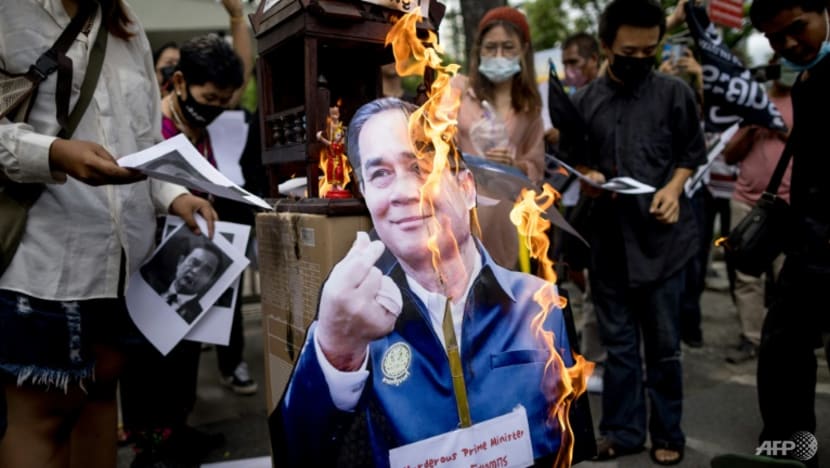Timeline: How Thai PM Prayut came to power and how he might lose it
Thailand PM Prayut Chan-o-cha was suspended from official duty on Wednesday (Aug 24) while the Constitutional Court decides if he has reached his 8-year term limit.

Embattled Thai Prime Minister Prayut Chan-o-cha was on Wednesday (Aug 24) suspended from official duty by the country's constitutional court after it unanimously decided to hear an opposition petition to review his legally mandated eight-year term limit.
Thailand's army-drafted 2017 constitution bars the prime minister from serving more than eight years in total, with opposition parties saying that Prayut, who seized power following a 2014 coup, has reached that limit.
Prayut's camp argues that the eight-year term limit in the constitution should not start retroactively, saying that he has been the prime minister from 2017 or in 2019, when he controversially won much-delayed national polls.
If the court accepts this logic, Prayut could potentially rule until 2025 or 2027 - if he wins a general election which is due next year.
Prayut's chances of victory at the polls have taken hits, with him looking to be increasingly out of favour with voters.
A recent opinion poll of 1,300 people by the National Institute of Development Administration found two-thirds wanted him to vacate office immediately, AFP reported.
"Uncle Tu", as Prayut is known, has never enjoyed widespread popularity, and Thailand's years-long economic battering has only exacerbated a public sense of stagnation.
CNA takes a look at a timeline of events that have taken place since Prayut's ascent to power in 2014.
Related:
2014: APPOINTED PRIME MINISTER AFTER A COUP
Prayut came to power while leading a military coup that ousted Yingluck Shinawatra's democratically elected government in 2014.
Then the chief of the army, he introduced martial law, seized control of the media and declared a nationwide curfew, among other measures to crack down on dissent.
The junta regime, called the National Council for Peace and Order (NCPO), suspended the constitution and unanimously elected Prayut - the sole candidate - as the prime minister in August.
The appointment was made formal after Prayut was endorsed by the late King Bhumibol Adulyadej.
In November that year, Suchai Pongput, an NCPO-appointed head of a special committee to monitor media, justified the media restrictions as necessary to ensure national reconciliation, according to a report by the Human Rights Watch.
Related:
2017: NEW MILITARY-DRAFTED CONSTITUTION
Thailand's current constitution was implemented in 2017, having been drafted by the military.
Significantly, it bars the prime minister from serving more than eight years in total. The interpretation of this rule has been the subject of much debate and has led to the current situation Prayut faces.
The new constitution also included changes to the voting system that would be implemented in 2019.
One change included was the removal for the requirement that the prime minister be selected from among the elected members of the House of Representatives.
2019: APPOINTED PRIME MINISTER AFTER POLLS
Prayut was elected prime minister after national polls in 2019, running as an independent candidate.
While they did not capture the most seats, the Palang Pracharath party, which had ties to the NCPO, received the most votes.
Prayut was nominated by the party as its candidate for prime minister.
The Election Commission came under criticism after the announcement of the election results saw multiple delays.
While unofficial results were announced four days after the election on Mar 28, 2019, official results were announced in May.
After the election, Prayut was voted in as prime minister when the National Assembly convened. The National Assembly has 750 members - comprising 500 members of parliament elected through a general election and 250 members of the Senate appointed by the military.
Prayut won with an overwhelming 500 votes to 244, 249 of which came from the Senate.
Opposition parties have said that the election was held under rules designed to keep him in power.
2020: ANTI-GOVERNMENT PROTESTS BREAK OUT
Prayut had to ride out months of street protests and anti-government demonstrations in 2020.
Political pressure had been building since the 2019 election, particularly when the anti-military Future Forward Party was dissolved by the constitutional court. The Future Forward Party had been a popular opposition party.
Despite the ongoing COVID-19 pandemic at the time, protesters gathered at Bangkok's Democracy Monument to hold the largest street demonstration since the coup in 2014.
The crowd of students chanted and waved placards denouncing Prayut's administration - and calling for the abolition of the Thailand's strict royal defamation law.
Thai police deployed tear gas and rubber bullets at some of the protests.
In Thailand, which has some of the world's strictest lese majeste laws, it is a crime to defame, insult or threaten the king, queen, heir or regent. Each offence carries punishments of three to 15 years in jail.
Anger at economic pain caused by the collapse in tourism due to COVID-19 was another factor for the protests.
The youth-led moment also saw the return of yellow-shirt wearing supporters of the palace; royalists wear yellow shirts that symbolise devotion to the monarchy.
2021: CRITICISM OVER HANDLING OF COVID-19
Prayut has faced much criticism over his handling of the COVID-19 pandemic.
Thailand initially seemed to be dealing with the pandemic well, enjoying months of no local transmission in 2020.
However, the situation took a sharp turn after a cluster at Bangkok's high-end nightclubs triggered waves of outbreaks that plunged the country into crisis.
The spread of the highly-contagious Delta variant and surging infections and deaths further served to raise public concern and provoke criticisms against the administration.
Amid reports of infected persons dying at home while waiting for hospital beds, insufficient COVID-19 vaccines and increasingly limited access to public healthcare, Prayut faced and survived a no-confidence debate in September 2021.
After taking a several-month break due to the pandemic, protesters would return to the streets to protest the Thai government's handling of the pandemic and its economic fallout.
2022: FOURTH NO CONFIDENCE-VOTE, SUSPENDED FROM DUTY
Which brings us to the current year.
Prayut emerged on top after his fourth no-confidence vote in July, securing enough votes to enable him to serve as premier until his term ends in March next year.
However, in August, opposition rivals sought to use the constitution whose design he oversaw against him - by calling for his removal under the rules which limit a prime minister to a maximum of eight years in office.
Opposition parties argue that he has crossed that threshold.
On Aug 24, the constitutional court suspended Prayut from official duty after it decided to hear the opposition's proposal.
Though he can still be restored to his position when the court makes its ruling, the surprise suspension has thrown Thai politics into confusion.


















